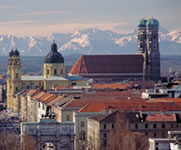"Fasching", "Fasnacht" or "Karneval" are all terms used to describe carnival, an ancient tradition which is celebrated all over Germany but particularly in the Rhineland and in the strongly Catholic regions of Germany. Mainz, Cologne, Düsseldorf and Bonn are hotbeds of carnival fun. In southern Germany the traditional Alemannic Fasnet is celebrated. The "fifth season" begins on 11 November and ends on Ash Wednesday. Carnival season reaches its climax in the week from "schmutziger Donnerstag" (literally: "dirty Thursday") to Ash Wednesday. There are major street processions on the Monday of that week, known as Rosenmontag or Carnival Monday. People dress up in humorous costumes or in traditional dress and masks, and join in processions and street festivals. The tradition stems back to the ancient custom of driving out winter.
Fairs
Between spring and autumn there are lots of fairs and festivals throughout the whole of Germany. Held on traditional festival grounds or in the city centres themselves, some last for a weekend while others last for a whole week. Entertainment includes a range of fairground stalls, carousels, rollercoasters, Ferris wheels and ghost trains. Food stalls offer snacks and sweet treats. There is often live music on open-air stages or in marquees. The Kirchweih or Kirmes (also known as Kerb, Kirb, Kier, Kerwe, Kerwa or Kerms) is a town fair that has its origins in a religious festival to celebrate the consecration of a Christian church. In rural areas the Kirchweih is still an important village institution. There are processions, and young men from the local area erect the maypole-like Kirchweihbaum.
Wine festivals
Wine festivals are held in many of Germany's wine-growing regions between May and November. Particularly along the Rhine and the Moselle, in Baden, Palatinate and along the river Main, wine-growers' cooperatives and representatives of wine-growing estates set up their stalls in public spaces and sell their wines by the glass. Local specialities are also served. The festivals usually also involve live music and, in many places, the crowning of the Wine Queen.
Oktoberfest
Germany's biggest and best-known festival is the Munich Beer Festival, also known as the "Oktoberfest" and the "Wiesn". More than six million visitors flock to the Theresienwiese every year to drink beer from large litre tankards and eat pork sausages and pretzels. The enormous fairground site also has carousels, rollercoasters and other spectacular fairground attractions. The festival programme includes a grand parade of landlords and breweries, the traditional costume parade and a concert featuring all the brass bands performing at the festival. Many of the locals, young and old alike, wear traditional dress when they visit the Oktoberfest.
For more information on the Munich Beer Festival, visit www.oktoberfest.de
Christmas markets
Christmas markets are held in many towns and cities from the end of November to Christmas. Their unique ambience is guaranteed to put visitors in the festive spirit. Interspersed with the stalls selling Christmas decorations, candles, jewellery, toys and other Christmas gifts are food stands where you can buy typical specialities such as mulled wine, spiced bread, gingerbread, hot chestnuts and roasted almonds.






